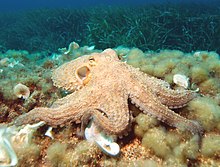Octopoda
| Octopus Temporal range: 323.2–0 Ma Late Carboniferous – Recent |
|
|---|---|
 |
|
|
Common octopus (Octopus vulgaris) |
|
| Scientific classification | |
| Kingdom: | Animalia |
| Phylum: | Mollusca |
| Class: | Cephalopoda |
| Superorder: | Octopodiformes |
| Order: |
Octopoda Leach, 1818 |
| Suborders | |
| Synonyms | |
|
|
The octopus (/ˈɒktəpʊs/ or /ˈɒktəpəs/; plural: octopuses, octopodes or octopi; see below) is a cephalopod mollusc of the order Octopoda. It has two eyes and four pairs of arms and, like other cephalopods, it is bilaterally symmetric. It has a beak, with its mouth at the center point of the arms. It has no internal or external skeleton (although some species have a vestigial remnant of a shell inside their mantles), allowing it to squeeze through tight places. Octopuses are among the most intelligent and behaviorally diverse of all invertebrates.
Octopuses inhabit diverse regions of the ocean, including coral reefs, pelagic waters, and the ocean floor. They have numerous strategies for defending themselves against predators, including the expulsion of ink, the use of camouflage and deimatic displays, their ability to jet quickly through the water, and their ability to hide. They trail their eight arms behind them as they swim. All octopuses are venomous, but only one group, the blue-ringed octopus, is known to be deadly to humans.
...
Wikipedia
